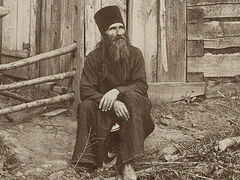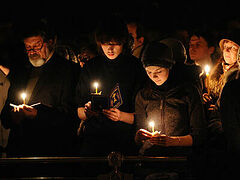Part 1/1: Let us Fast in Earnest
Part 1/2: The Meaning and Significance of Fasting
Part 1/3: Accustoming Ourselves to Fasting
Part 1/4: Spiritual Fasting
Part 2/1: On Prayer. What is Prayer?
Part 2/2: How to Prepare for Prayer?
Part 2/3: How to Pray?
Having learned to turn to God with your heart and mind with written prayers, you must then teach yourself to turn to Him with your own prayerful sighs as often as possible.
After finishing your prayer rule, especially in the morning, say with St. Dmitry of Rostov: “Go forth, holy contemplation, and let us immerse ourselves in reflection on the great works of God.” During this, sit down and begin to reflect—now on one, tomorrow on another of God’s properties and works, and produce the corresponding disposition in your soul; touch your heart with this, and you’ll begin to pour out your soul in prayer.
Begin, for example, to reflect on the goodness of God, and you’ll see that you’re surrounded by the mercies of God both physically and spiritually, and you’ll fall before God in an outpouring of feelings of gratitude. Begin to reflect on the omnipresent God, and you’ll understand that you are before God everywhere and God is before you, and you can’t help but be filled with reverent awe. Begin to reason about the truth of God and you’ll be assured that no evil deed goes unpunished, and you’ll certainly resolve to cleanse all your sins with heartfelt contrition before God and repentance. Begin to reflect on omniscience, and you’ll know that nothing in you is hidden from the eye of God, and you’ll certainly resolve to be strict with yourself and attentive in everything, so as not to offend the All-seeing God in any way. This is the first means of teaching the soul to turn to God with its prayer, that is, divine contemplation, as often as possible.
The second means for this is to turn every work to the glory of God. If you make it a rule for yourself, according to the Apostolic commandment (1 Cor. 10:31), to do everything, even eating and drinking, to the glory of God, then you will surely, in every deed, great or small, remember God; and not simply remember, but with fear, lest you act unseemly in any situation or offend God with any deed. This will make you turn to God with fear and prayerfully ask Him for help and admonition. And since we’re almost always doing something, we will almost always turn to God in prayer. We can thus teach our soul to turn to God as often as possible throughout the day.
The second means of teaching the soul to purely turn to God is to frequently call upon God from the heart with short words, according to the needs of the soul and current affairs. When you start doing something, say: “Lord, bless!” When you finish it, say not only with your tongue, but with the feeling of your heart: “Glory to Thee, O Lord!” When some passion arises, say: “Save me, Lord, for I am perishing!” When you’re in a darkness of confused thoughts, cry out: Bring my soul out of prison! (Ps. 141:10). When you’re faced with unrighteous deeds and being drawn into sin, pray: Guide me, O Lord, in Thy way (Ps. 85:10) or, “Give not my feet unto confusion!” (cf. Ps. 120:3). When sin suppresses you and leads you into despair, cry out with the voice of the publican: God, be merciful to me a sinner! (Lk. 18:13). And so on in every situation. Or simply say more often: “Lord, have mercy! My Lady, Most Holy Theotokos, save me! Angel of God, my holy guardian, keep and protect me!” Or cry out with other such words. Only, make these appeals as often as possible, and strive in every way so that they might come from your heart, as if squeezed out of it; and thus you will acquire the skill of noetic conversation with God.
And so, in addition to the prayer rule, following after it is divine contemplation—turning our every deed to the glory of God; short, heartfelt appeals to God are the most effective tools for acquiring a constant spirit of prayer and properly God-pleasing and beneficial prayer.
Oh, my beloveds, if we were disposed to pray according to the above, then with the help of the grace of the All-Holy Spirit, we would acquire a prayerful spirit and true prayer! Then we would grow a second wing of prayer, healthy and strong, and we would easily ascend to God on the wings of fasting and prayer.
Amen.







